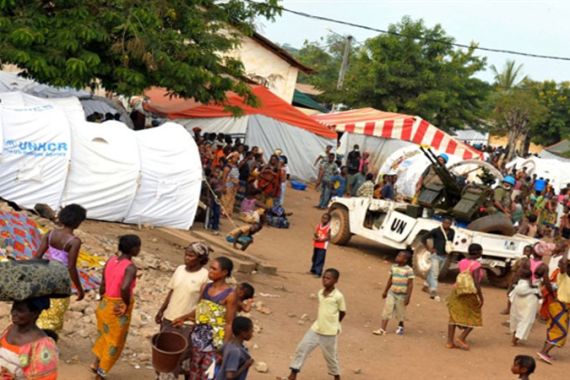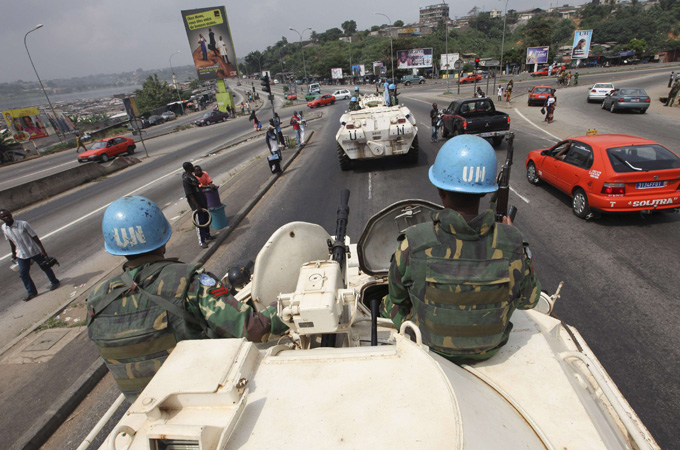The shield of innocence
The laws of war were designed for traditional conflicts between European standing armies, not insurgencies.

 |
|
From the very beginning, the West had one set of rules for warfare among Western states, and another for war with the rest of the world, Tarak Barkawi argues [Reuters] |
Lately, the West and the UN have been using force to “protect civilians”. One might say they are using “human shields” as cover for military intervention.
The idea of a “civilian” depends on an association between innocence and the non-combatant. When Hamas, Gbagbo or Gadaffi position military assets amid civilian populations, they are using the “innocent” as cover for the “guilty”.
Even more shocking, “terrorists” like Hamas wage war without apparent regard for the distinction between civilians and combatants.
This distinction is a regulative principle of the Western way of war, and of the politics and laws which govern it. Those who respect civilians and protect them are the good guys, and have the right to bear arms.
They are the civilised world, and know themselves to be such by virtue of righteously disembowelling the odd barbarian now and again.
“Terrorists” who fight in ways that do not respect the combatant/non-combatant distinction are not worthy combatants. They are bad guys, savages.
They forfeit the right to be treated according to the protocols of civilised warfare. This is why Guantanamo makes sense to many Americans, and why the International Criminal Court (ICC) and its profoundly selective indictments are so popular among the “good Europeans”.
If you do not fight war by the Queen’s Rules and manage to survive, you risk being “rendered” in a CIA Learjet or given a show trial in The Hague. For the ICC, war criminals are found only among Arabs and Africans these days. In this, contemporary liberal opinion follows in the imperial footsteps of its forbears.
Origins of laws of war
The laws of war arise from the conventions regulating wars between Europe’s Christian sovereigns in the early modern period. In a war between such sovereigns, it is possible to act towards your opponents in a spirit of Christian love and charity, respecting non-combatants, repatriating prisoners and so on.
However, in wars against barbarians, a Christian prince was not under similar obligation to act in accordance with the laws of war as they applied in Europe.
From the very beginning, the West had one set of rules for warfare among Western states, and another for war with the rest of the world.
Another consequence of the European origins of the laws of war is that they are suited ideally for conflict between sovereign states and their official military forces.
Such forces are clearly distinguished from non-combatants by their uniforms and the fact that they bear arms.
Irregular war, guerrilla war, the war of the weak against the strong, is always already on the wrong side of the law, and therefore of “civilisation”, because it is very difficult to clearly distinguish between the fighters and the people.
To be sure, lawyers and others have tried to make these distinctions work, tried to pick out the innocent in wars fought among the people.
It is very difficult, however, to apply such a Biblical category to the world of war, either in Europe or outside it. What marker of innocence are we to use after all? Women can work in arms factories or bear arms, as can their children. Even the old can participate!
Notably, two of the great conventions on the laws of war, the Hague Conference of 1899 and the Geneva Conventions of 1949 were inspired by dark deeds committed in Europe, in the Franco-Prussian War and in World War II.
As Hannah Arendt noted, Hitler’s great crime was to treat Europe like a colony. The tremendous die offs and slaughters that regularly arose from European behaviour outside Europe before the Nazis had not warranted such efforts.
Moral bankruptcy
Mass politics and mass mobilisation warfare fatally compromised the image of war behind the Queen’s Rules, even among sovereign states.
War has a way of implicating everyone in its wide reach, turning them into victims and executioners, often at the same time. The politics of a war do not generally admit of clear distinctions between the good guys and the bad guys, especially once you start looking closely.
What, then, are Westerners shielding themselves from in their insistence on “protecting civilians”? They are protecting themselves from the full implications of what they are up to in using force. The price is strategic and moral bankruptcy.
The Ivory Coast is in a state of civil war. France and the UN have taken sides in this war, officially speaking on the basis of an election victory in a divided country.
There might well be good strategic reasons for international involvement given the significance of the cocoa crop, or one may judge the former IMF economist Ouattara as better for the future of the Ivorian people and worth supporting.
Instead of this debate, UN and French strikes against Gbagbo’s heavy weapons – clear acts of war – were justified as part of a mandate to “protect civilians”.
Gbagbo’s spokesman commented drily: “The residence of the head of state is not a heavy weapon”. Meanwhile, everyone has to pretend Ouattara’s forces do not kill innocents while Gbagbo’s do.
In Libya, the more plain speaking Americans having left the stage, we are entering a period of humanitarian absurdity. The Europeans are contemplating entering Misurata, not to clear it of Gadaffi’s forces, but to provide relief to the victims of the fighting.
The Europeans apparently think they can bomb one moment, and play Red Cross the next. They take sides, but they do not take sides.
Amid all the smoke and mirrors, it is impossible to think or speak seriously about the diabolical dilemmas involved in using force and going to war.
Tarak Barkawi is Senior Lecturer, Centre of International Studies, University of Cambridge. He specialises in the study of war, armed forces and society with a focus on conflict between the West and the global South in historical and contemporary perspective. He is author of Globalization and War, as well as many scholarly articles.
The views expressed in this article are the author’s own and do not necessarily reflect Al Jazeera’s editorial policy.
